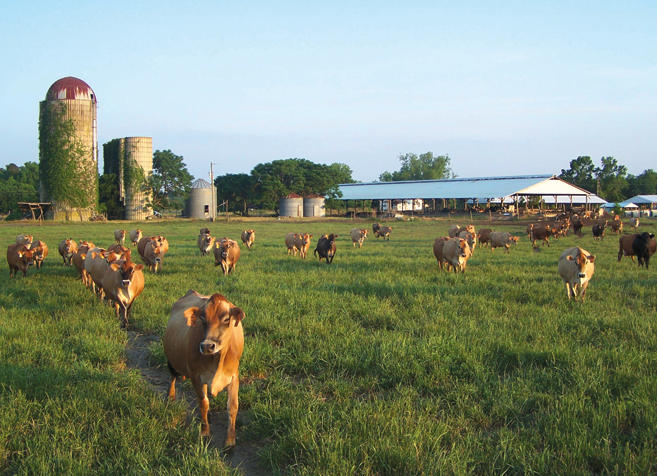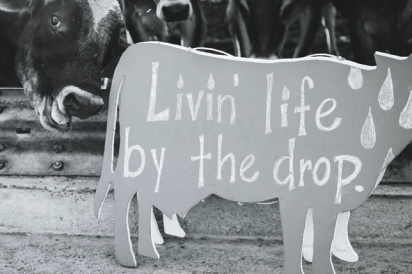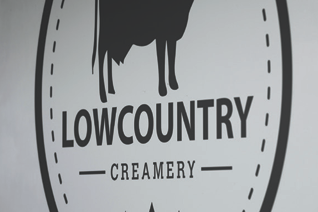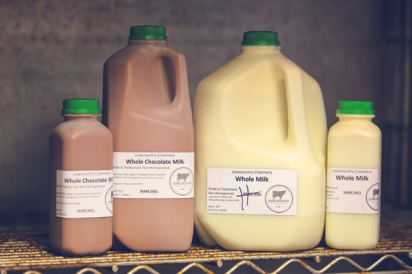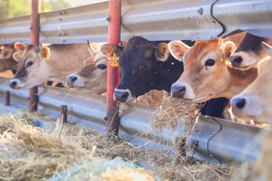Bringing the Cows Home
The scent of cows and grass hit our noses immediately as we drove up to the farm. We were in the right place. Patrick Myers greeted us on his Clemson Tigers-clad golf cart. “Jump in—we’re gonna go see the cows. That’s the best part of this story,” he tells us, mostly serious. Elizabeth, Avery (my 11-month-old boy) and I jumped in, and off we rode to see the cows. As we passed the milking stalls and neared the area where the calves are kept, Myers gave us the background of how Lowcountry Creamery came to be.
“This is my family’s farm. I grew up on this farm milking and working cows as far back as I can remember.” In 2004, while he was working on his master’s in ruminant nutrition at Clemson, “my dad called and told me we couldn’t sustain the dairy any longer and he had to shut it down.” At that point, Myers wasn’t inclined to disagree, but as he finished school and started his life in the dairy industry, he wanted to have his own dairy farm again. In 2009 he and his longtime friend, Kent Whetsell (also a Clemson grad, with an extensive background in livestock health and care), leased the depressed dairy farm, once known as Landsdowne Dairy, from the Myers family, bought Jersey cows and brought dairy back to the Myers’ farm.
We reached the pasture where the cows met us at the gate. Following behind us was Whetsell, coming up on the tractor; it was almost feeding time. There are currently 220 cows on the farm—180 of which are milking at any given time. Myers and Whetsell keep a small herd by design; they don’t want the cows to be a number, they want to know them, enjoy them and keep them happy and healthy. They explained how they started this venture with bigger vision in mind— Lowcountry Creamery. The revitalization of Landsdowne Dairy was their first step to owning a local, sustainable business. At that point, all their milk was being sold to a milk co-op and not being sold anywhere locally. Myers and Whetsell wanted to continue to run a small dairy, but knew they couldn’t maintain the farm on just milk sales. A creamery would offer artisan dairy products, an unmet demand in the Lowcountry.
This, in turn, would create a higher demand for the milk they produced and therefore sustain the dairy farm, essentially allowing them to do what they love—to be dairy farmers. Several campfire conversations later, and with some help from their college friend, Josh Brooks, the trio settled on the idea of opening a specialty creamery, figured out financing, established a business model, and in 2015, Lowcountry Creamery made its first batch.
“Fresh, handcrafted, small batch, minimally processed—that’s what we do,” says Myers emphatically. Their passion and dedication show in every aspect of the operation. They keep a higher fat content in their products and use a low pasteurization method, maintaining the unique and delicious flavor in all their products. From pasturing their cows to their pasteurization process, their technique is both art and science, to assure that Lowcountry Creamery produces high quality products, which are now in high demand. The demand spreads from the local Bowman residents picking up milk from the BP station on Vance Road (the same building the Creamery is in), to having notable Charleston chefs using their creme fraiche in their specialty dishes.
“Essentially we create what the chefs want. We produced Greek yogurt initially, and received requests from chefs: - ‘can you make creme fraiche? And buttermilk?’” So they did. Along with nonfat yogurt, whole milk and chocolate milk (the best I’ve tasted). The flavor is rich, creamy and decadent. And it’s all crafted by design: as a ruminant nutritionist, Myers developed a custom feed blend, paying attention to specific nutrients and ingredients, and Whetsell’s expertise and enthusiasm for managing the herd and giving specific attention to how they are raised and socialized all contributes to the unique flavor profile of their products.
“We started out only using about a half of a percent of our milk from the farm and are now up to utilizing 5% to make our Lowcountry Creamery products, with hopes to increase that to 40% utilization,” explains Myers. Their partnership with GrowFood Carolina, the local food hub that sells, markets and distributes products to retailers, restaurants, cafeterias and community partners, has been their primary means of distribution.
We were interrupted by a calf that meandered over to listen in on the conversation. “This one always gets out. She’s very social, wants to see what’s going on.” It was feeding time and our visit to the farm was coming to an end. We grabbed a gallon of milk and said our goodbyes to the long-lashed Jersey cow until our next visit to the farm.
Milking It!
RETAIL LOCATIONS:
MAC’S BP STATION, BOWMAN
CRAVE ARTISAN SPECIALTY MARKET, COLUMBIA
COASTAL COFFEE ROASTERS, SUMMERVILLE
THE DALY, CHARLESTON
THE VEGGIE BIN, CHARLESTON
MERCANTILE AND MASH, CHARLESTON
GOAT.SHEEP.COW, CHARLESTON
WHOLESALE:
GROWFOOD CAROLINA, CHARLESTON
FARMERS MARKETS:
THE SUNDAY BRUNCH FARMERS MARKET, CHARLESTON
THE MT. PLEASANT FARMERS MARKET, MT PLEASANT
WEST ASHLEY FARMERS MARKET, CHARLESTON
BLUFFTON FARMERS MARKET, BLUFFTON
HOME DELIVERY:
THE BOUNTY BOX
FARM TO TABLE DELIVERY
BOOP BABY


